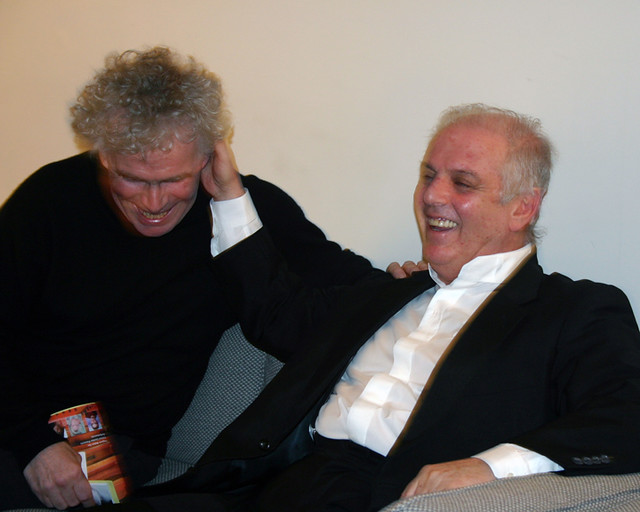Barenboim and Rattle – joined at the hip?
mainA friend mentioned that he’s going to Berlin at the weekend to hear Barenboim conduct Dream of Gerontius with the Philharmonic. Some mistake, surely? I protested.
Elgar is prime Rattle territory. Why would he relinquish it to a local rival?
The answer is more tactical than strategic. Both men are consummate politicians who know how to give a bit here, take a bit there. They have a range of common interests and a need to safeguard their empires.
Knowing that Barenboim learned his Elgar from Sir John Barbirolli and wanted to conduct the Dream in tribute, Rattle graciously consented.
It’s a win-win for him. If Barenboim triumphs, Rattle will be praised for generosity, if he fails the Englishman can show how it’s done next season.
The affinities stretch beyond Berlin. Yesterday, Rattle was announced with Placido Domingo as co-winner of the state of Israel’s biggest arts prize. Barenboim was awarded the Wolf in 2004 and accepted it with a Knesset speech dissenting from the state’s Palestine policies. Will he advise Rattle to so something similar? He has invited Rattle often to conduct at the Berlin Staatsoper. Might he now introduce him at La Scala?
The dance continues, and it’s one of the more entertaining spectacles at a dulled-down classical summit.

photo: Evelyn Taylor, flickr.com





Mafia Dons occasionally have to respect each other’s territory. Otherwise someone gets the horse head in the bed.
It is ridiculous to suggest that Simon Rattle is territorial about Elgar and that he has made a diplomatic concession to Barenboim. At the press conference announcing the 2011/12 Berlin Philharmonic season, Rattle said that an English flavour had by chance come into the programming with Semyon Bychkov conducting Walton’s first symphony, Donald Runnicles doings Elgar’s first, and Rattle conducting Tallis’s Spem in Alium. Rattle phone Barenboim and asked him if he wanted to do some Elgar and Barenboim said he had always wanted to conduct the Dream of Gerontius. In fact, Rattle has been carefully avoiding conducting English music with the Berlin Phil, except on rare occasions, and he will be conducting the Enigma Variations this spring for the first time with them. I have just listened to the broadcast (on Deutschland radio Kultur) of the first of Barenboim’s three perfromances of Gerontius and sadly I thought it was disastrous. Barenboim’s pulled the whole piece apart with exaggerated tempi and gear changes, such as huge rallentandi in the middle of the demons’ chorus; the orchestra sounded nervous and under-rehearsed; and the chorus struggled with Elgar’s difficult counterpoint when they were rushed through by Barenboim after some dramatic effect. In fact, he achieved neither drama nor the sublime. What a shame as this is is the first time Gerontius has been given by the Berllners since 1979. There is a live broadcast in the Digital Concert Hall on Saturday of the third performance, and it would be interesting to see if it is any better.
I was at the Friday performance. Revelatory. All in all the best Gerontius I have heard live and I have heard about a dozen going back 30 years, mostly in London. There were a few imprecisions such as will happen in live performance and Barenboim’s tempi and his use of rubato did mean that orchestra and chorus had to be on their toes. Barenboim is improvisatory in performance which is why we in Berlin adore him. No two performances are the same. But the quality of orchestral playing and choral singing meant that this was a Gerontius way above and beyond any standard performance in the UK.
Barenboim’s tempi were idiosyncratic with regard to what one is used to. The prelude was much slower than usual but had a hushed intensity I have never before encountered. Otherwise tempi tended to be on the fast side. The demons’ chorus did have loads of rubato – the orchestra visibly loved it and the choir followed him every step of the way. Quite simply, I have never heard a better choir in this music. But then Simon Halsey is incomparable as a choir master.
Storey, in his first Gerontius, was extraordinary. He has reclaimed the role for the heroic tenor after a long tradition of King’s College alumni. The Tristan of our age brings all his experience in that role to bear on the ravings and sufferings of Gerontius. How often do we find an heroic voice that can sing softly? Without resorting to crooning or falsetto this was a Gerontius who coloured and lived the role with a searing intensity. I am not sure I will henceforth be able to accept a lyric tenor’s ‘Take me away’. This was a really generous performance, alert to the idiosyncrasies of his Maestro, and unstinting in outpouring of passionate tone.
I have heard better Angels than Anna Larsson. She is an intelligent singer but the voice is not inherently beautiful and she was stretched by the part.
Kwangchoul Youn impressed. Few can encompass the demands of the high flying Priest and the more bass-like Angel of the Agony but he pulled it off, and in creditable English.
I think this was an important performance, not only in bringing Elgar’s masterpiece to a German audience in resplendent form, but also in revealing the work as a restored painting. Everything was approached anew. A reading which had only Ian Storey as an English element. It presented Elgar to the world.